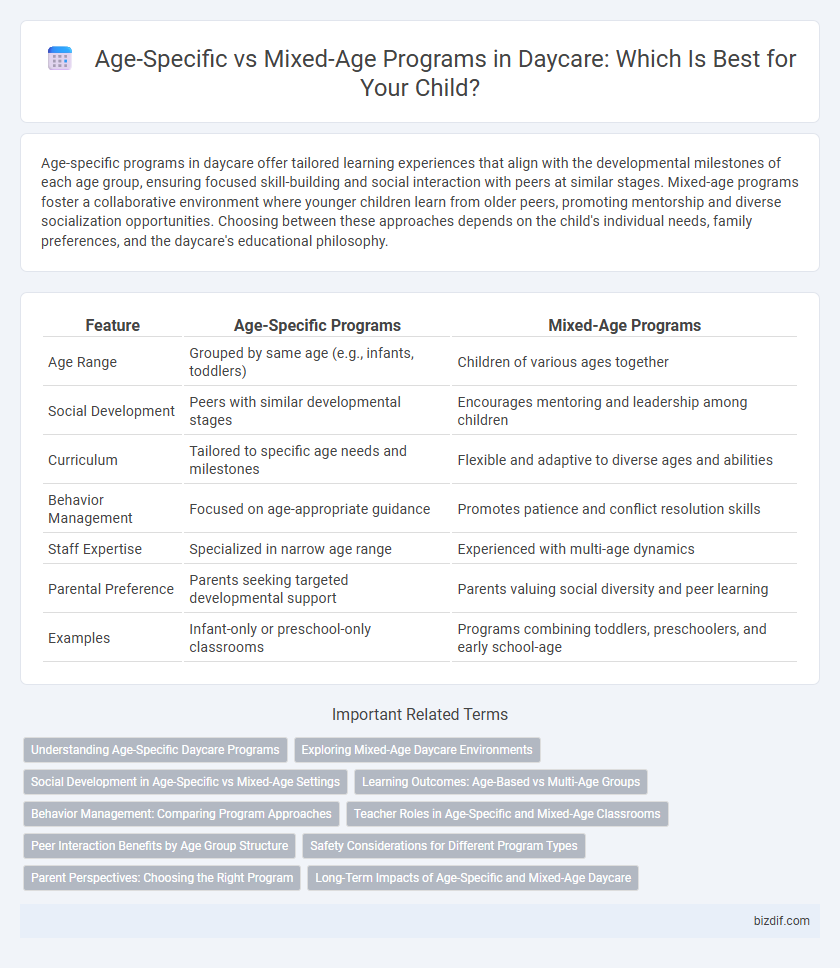Age-specific programs in daycare offer tailored learning experiences that align with the developmental milestones of each age group, ensuring focused skill-building and social interaction with peers at similar stages. Mixed-age programs foster a collaborative environment where younger children learn from older peers, promoting mentorship and diverse socialization opportunities. Choosing between these approaches depends on the child's individual needs, family preferences, and the daycare's educational philosophy.
Table of Comparison
| Feature | Age-Specific Programs | Mixed-Age Programs |
|---|---|---|
| Age Range | Grouped by same age (e.g., infants, toddlers) | Children of various ages together |
| Social Development | Peers with similar developmental stages | Encourages mentoring and leadership among children |
| Curriculum | Tailored to specific age needs and milestones | Flexible and adaptive to diverse ages and abilities |
| Behavior Management | Focused on age-appropriate guidance | Promotes patience and conflict resolution skills |
| Staff Expertise | Specialized in narrow age range | Experienced with multi-age dynamics |
| Parental Preference | Parents seeking targeted developmental support | Parents valuing social diversity and peer learning |
| Examples | Infant-only or preschool-only classrooms | Programs combining toddlers, preschoolers, and early school-age |
Understanding Age-Specific Daycare Programs
Age-specific daycare programs cater to distinct developmental stages, offering tailored activities that enhance cognitive, social, and motor skills appropriate for each age group. These programs provide a focused environment where infants, toddlers, or preschoolers receive specialized care and age-appropriate learning experiences. Educators in age-specific settings apply targeted teaching methods that address the unique needs and growth milestones of children within narrow age ranges.
Exploring Mixed-Age Daycare Environments
Mixed-age daycare environments foster social development by encouraging interactions among children of varying ages, which enhances empathy and leadership skills. These programs provide diverse learning opportunities as younger children benefit from observing older peers, while older children reinforce knowledge by mentoring. Research indicates that mixed-age settings promote adaptability and emotional intelligence, offering a dynamic alternative to age-specific programs focused solely on uniform developmental milestones.
Social Development in Age-Specific vs Mixed-Age Settings
Age-specific programs in daycare promote targeted social skill development by grouping children with similar developmental stages, facilitating peer bonding and age-appropriate interactions. Mixed-age programs foster mentorship and empathy, allowing older children to model positive behaviors and younger ones to learn through observation. Both settings enhance social development uniquely, with age-specific groups supporting comfort and confidence, while mixed-age groups encourage adaptability and leadership.
Learning Outcomes: Age-Based vs Multi-Age Groups
Age-specific programs in daycare tailor curriculum to developmental stages, enhancing targeted cognitive and social skills for each age group. Mixed-age programs foster peer learning and mentorship, promoting empathy, leadership, and adaptability among children. Research indicates multi-age settings often improve social competencies and collaborative problem-solving, while age-based groups excel in mastery of age-specific milestones.
Behavior Management: Comparing Program Approaches
Age-specific programs tailor behavior management strategies to developmental stages, using targeted techniques that address the unique social and emotional needs of each age group. Mixed-age programs encourage peer modeling and mentorship, promoting positive behavior through natural social interactions and cooperative learning across different ages. Research indicates that behavior management in mixed-age settings can enhance empathy and conflict resolution skills, while age-specific programs offer more structured discipline aligned with age-appropriate cognitive abilities.
Teacher Roles in Age-Specific and Mixed-Age Classrooms
Teachers in age-specific programs tailor their approaches to developmental milestones, using specialized activities that enhance cognitive and motor skills for distinct age groups such as infants, toddlers, or preschoolers. In mixed-age classrooms, educators facilitate peer learning and social interaction across age groups, promoting mentorship and adaptability by balancing individual needs with group dynamics. Effective teacher roles in both settings require expertise in developmental psychology and flexible strategies to support varied learning paces and social-emotional growth.
Peer Interaction Benefits by Age Group Structure
Age-specific programs in daycare settings facilitate targeted social development by grouping children with similar cognitive and emotional stages, enhancing peer interaction that supports tailored learning and emotional understanding. Mixed-age programs encourage mentorship opportunities and social adaptability by allowing older children to model positive behaviors for younger peers, fostering empathy and leadership skills across age groups. Both structures promote essential peer interaction benefits, with age-specific groups emphasizing age-related skill development and mixed-age environments enhancing social diversity and cooperative learning.
Safety Considerations for Different Program Types
Age-specific daycare programs enhance safety by tailoring activities and environments to developmental milestones, reducing risks associated with mismatched abilities. Mixed-age programs require vigilant supervision and well-structured protocols to prevent accidents, as younger children may be vulnerable to the physical and social dynamics of older peers. Implementing age-appropriate safety equipment and staff training in both setups is crucial for minimizing hazards and ensuring child well-being.
Parent Perspectives: Choosing the Right Program
Parents often prefer age-specific programs for their structured curriculum tailored to developmental milestones, ensuring targeted learning for their child's growth stage. Mixed-age programs attract parents who value socialization opportunities, allowing children to learn empathy and leadership by interacting with peers of varying ages. Choosing the right program depends on individual family priorities, such as the desire for specialized academic focus versus fostering diverse social skills.
Long-Term Impacts of Age-Specific and Mixed-Age Daycare
Age-specific daycare programs enhance targeted developmental milestones by grouping children with similar cognitive abilities, promoting tailored learning and socialization that supports long-term academic success. Mixed-age programs stimulate mentorship, empathy, and leadership skills, fostering adaptability and collaborative problem-solving with benefits extending into adulthood. Research indicates that children from mixed-age environments often develop stronger interpersonal skills, while age-specific settings more consistently improve standardized cognitive assessments over time.
Age-Specific Programs vs Mixed-Age Programs Infographic

 bizdif.com
bizdif.com